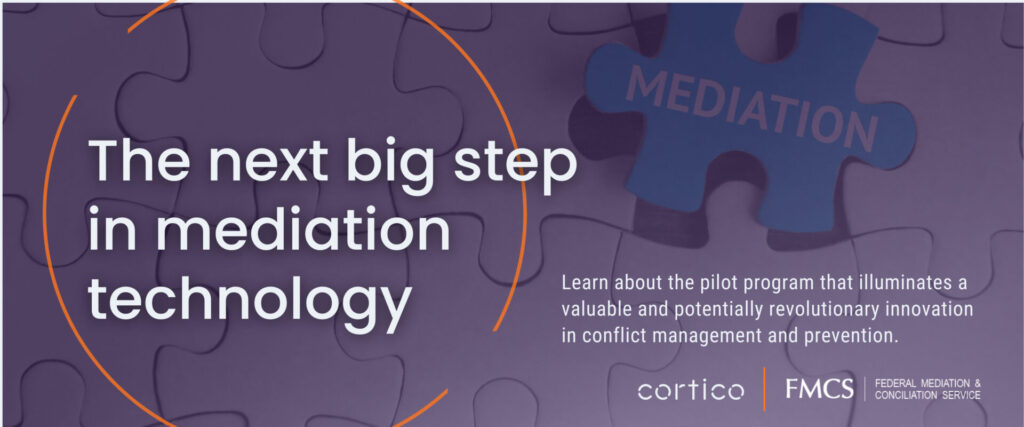
The Federal Mediation and Conciliation Service (FMCS), created in 1947, is an independent agency whose mission is to build better, more effective workplace relationships and mitigate the damage from inevitable conflict through preventive dialogue, honest communication, and responsive strategies.
Headquartered in Washington, DC the agency provides mediation and conflict resolution services to industry and its organized workforces, government agencies, and for large-scale government-to-stakeholder public policy negotiations.
While FMCS has a long legacy of assisting employers and employees in coping with the demands of a rapidly changing workplace, the COVID-19 pandemic presented an unprecedented set of challenges. FMCS was forced to quickly transition all of its client-related mediation into digital environments, while simultaneously navigating major internal shifts including a leadership transition and realignment.
But as any FMCS mediator knows well, periods of discord can elicit major opportunities for growth. The shift to digital environments inspired leadership to consider how technology might advance, capture, and elevate its practices more broadly.
FMCS turned to the MIT Center for Constructive Communication (CCC) and its close collaborator Cortico to partner in this exploration.
At the very first meeting in December 2021, FMCS Commissioner and Mediation Technology Specialist Kevin Hawkins recalls feeling awestruck at the potential for the methods and the tools designed at MIT CCC and deployed by Cortico to build stronger listening channels for FMCS clients:
“Mediators put a tremendous amount of time and talent in the effort toward helping parties understand each other, hear each other. And suddenly, right before my eyes, a platform appeared to provide a vehicle through which we can give every stakeholder a voice and every voice can be heard! The voices reveal actual truth, not conjecture, and expose blind spots, areas of concern and opportunities with a clarity I have never seen before.”
Kevin Hawkins, Commissioner, Mediation Technology Specialist, FMCS
After learning about Cortico’s technology and process, the team began to imagine how it might be applied for an FMCS pilot program. Considering the major internal shifts the Agency was already navigating, an idea emerged that would work to both alleviate this turbulence and introduce mediators across the organization to the technology: FMCS would use the platform on themselves.
40+ FMCS staff across a range of departments and tenures were invited to join recorded small-group conversations with 4-6 participants. Conversations were facilitated by FMCS staff who attended an orientation led by Cortico and MIT CCC.
During these conversations, FMCS staff members reflected on the recent transitions and impacts of the pandemic, shared their personal experiences with organizational culture at FMCS, listened to the stories of others, and considered the connections, tensions, visions, and commonalities that emerged in their groups.
After the conversations were facilitated and recorded, the work of deep listening and human-led analysis began. The conversations were uploaded to Cortico’s Local Voices Network (LVN) platform and became part of a voices collection. The sensemaking team at FMCS, Cortico, and MIT CCC actively engaged with the conversations to analyze, make meaning, and thematically organize surfaced insights into a public-facing conversation portal to easily explore and listen to the stories and experiences of FMCS staff.
After collecting and sensemaking, the Cortico team built a project portal to amplify and memorialize the conversations. The portal provides an interactive way for participants to engage with and listen to the voices from the conversation collection. FMCS staff are using their new portal to listen and better understand the hopes, concerns, and experiences of their colleagues.
FMCS employee reflects on their experience shifting to virtual work:
The positive, forward-looking approach recommended by Cortico and MIT CCC was tremendously beneficial at FMCS: federal mediators greatly appreciated the opportunity to share how proud they are of the positive impact their work has in communities across the country. Mediators talked about the underlying factors that drive their work and their endless search to help their parties reach better, more durable agreements. The results posted on the LVN platform enabled FMCS policy decision makers to easily identify trends to guide the agency’s thinking during realignment. With LVN, FMCS avoided a simple bureaucratic reorganization. Instead, the realignment used the positive energy generated and became an invaluable redesign to help mediators gravitate to more successes that drive their enthusiasm coupled with vastly reduced administrative tasks. The changes derived from the LVN learning mean an improved FMCS – and more importantly, better service for our nation.
After reviewing the results and learnings gleaned from the partnership pilot program, FMCS, MIT CCC, and Cortico are utilizing that knowledge to outline and develop practical use cases for application in FMCS field work and the education and development of the next generation of peacemakers and practitioners of conflict management and prevention.
“After spending much time learning about new technological approaches to stakeholder engagement and conflict management being actively researched and developed by our academic collaborator, MIT CCC, I am convinced these exciting developments will dramatically enhance our work and service delivery to the country in these spaces – in some cases by leaps and bounds.”
Joshua Flax, Deputy Director for Policy & Strategy, FMCS
The ambition is that this pilot establishes the beginning of the advancement of the art, science, and practice of conflict management and prevention.